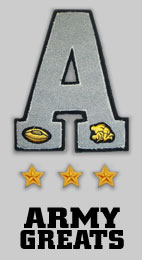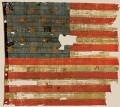Lowell Remembers
1
After an injury incident in a plebe football game in October 1950 at which time I received a hit to my throat and what the doctors called a ‘severe contusion of the larynx’, football unknowingly became a crap shoot for me. It took me about 45 years to learn that I had essentially lost a vocal cord because of the 1950 incident. And if I had ever received another blow to my throat it could have been life threatening. Because of this, 53 years after the incident I started receiving a disability benefit from the VA.
#2
During the 1953 season the rules of substitution changed (ostensibly because of the Korean War and the lack of young men to play college football) to essentially eliminate the two platoon system that had been used previously.
#3
After the 1952 season, during which I played offensive end, I was switched to play halfback at the start of Spring practice. I continued in that mode until just before the start of the 1953 season. About 10 days before the season was to start I was called in to Col Blaik’s office. Fearful regarding what the reason was, I reported in to find Col Blaik and Vince Lombardi there and they proceeded to ask me what my reaction would be if they were to switch me back to end. I said I did not care where they wanted me to play as long as I could be of value to the team. They did not explain why they wanted to make this change and I did not ask … maybe I should have. I speculated that the new substitution rule had something to do with it. I must admit I always thought I was a better halfback than an end.
#4
Twenty-twenty hindsight revealed to me that they knew they had a diamond in Don Holleder and with the two platoon system he would have more than replaced me. But because we had to play both offense and defense they must have concluded that it would be better to leave me at end.
#5
Because of the switch back to end I did not get totally grooved into playing defensive end and this contributed (in my mind) to a large degree why we lost our only game that season. I felt I played a terrible game against Northwestern and contributed mightily to our defeat. The words that come to my mind describing my play were “no man’s land” because that is where I felt I was for most of the game.
Editor’s Note — Lowell made up for the Northwestern loss in the Navy Game.
On the kickoff, Norm Stephen came down the field so fast and so hard that he had knocked the ball right out of the Navy player’s hands and right into Lowell’s hands on the Navy 30 yard line. Lowell remembers Norm Stephen as a real leader, a motivator for the Team.
#6
When I was first approached (in church 1949) and asked if I would consider going to West Point I immediately had stars in my eyes (which eventually became wild dreams) because I was nuts about football and my biggest heroes at that time were Doc Blanchard and Glen Davis. I thought to myself I could play for Army and didn’t give any thought to the fact that I might not even make the team. So a year later there I was at West Point still blinded with the same stars and dreams. It turned out almost better than I dreamed because I ended up making the team and Doc Blanchard came back to coach (awesome) and Arnold Tucker the wonderful Quarterback was there as a TAC officer. And I/we got an incredible bonus of having “John Green” (All-American and team captain of one of those teams) as a coach. John was one of the finest men I have ever met. More about him later….
Time out needs to be taken from the anecdote list to describe the reactions of my wife (Connie) and my daughter (Margaret) to the first five anecdotes. They asked — “why are you being so negative?” and my reply was this is just the way it was and there is no reason to gloss over that fact.
#7
In 1951 we stunk up the place really good and were even beaten by Harvard (the first time since 1890) I was told. We did win a couple of games however. Navy clobbered us 42-7 that year and we went back to West Point with our tails between our legs.
#8
In 1951 we traveled to Los Angeles to play Southern California and didn’t do as badly as one would think. The best player no the USC team was Frank Gifford. I was matched up across from a rather giant tackle by the name of Charlie Ane. Charlie was a fairly nice guy and it seemed to me much like the Michelin Man. He seemed to be rather soft when I tried to block him. He went on to Pro Football and did quite well.
#9
In 1952 we again played USC this time at Yankee Stadium in the rain and snow, as I recall. Again we did reasonable job against them — they did not blow us out. And Frank Gifford again was the star, if my memory serves me correctly.
#10
The Navy game 1952 was much more sensible than the year before but we still got beat 7-0. Progress was being made. Our record that year was 4-4-1.
#11
Then came 1953. Many things had changed since the cribbing scandal and we were the “benefactors” of them. They were things like more SI’s amd more parades. These things did not happen just in 1953. They started in 1951.
#12
Our coaching staff was incredible and included Col Earl Blaik, Vince Lombardi (remember him?), “Paul Dietzel”, “Paul Amen”, “Bobby Dobbs”, “Carney Laslie”. All were head coaches of major universities after leaving West Point, with the possible exception of Laslie. I have often said over the years we all should be Heisman Trophy winners by now with a staff like that. One of my favorites “John Green” had left the year before and I believe went to Vanderbilt as Head Coach. If I am not mistaken John was to die a premature death. What a loss, I can remember when we were pulling out of the Academy one Saturday heading for a game and John came in to say good bye because he was going to be leaving. I sat there with tears in my eyes waving out the window at him.
#13
“John Green” … in 1952 we had a problem with long snapping the ball and were asked if anyone who thought they could, try out for job. In my inimitable manner raised my hand.
I “won” the job and proceeded to snap the ball over “Fred Attaya”‘s head twice in one game. John was given the job of “teaching” me how to do it and not be afraid. I was asked to report to the practice field early for my “instruction” session with John. I would get over the ball and snap it to a receiver and John, who was in front of me, would “snap” me and it seemed to me I would end up in the lap of the receiver before the ball got there.
I told John I was not afraid of getting hit but had just psyched myself out. I was retired from the job. In 1953 after “Fred Attaya” was injured I took over from him and did the kicking. What goes around comes around. I did the kicking for my high school team.
#14
Don Holleder was a substitute (of all things) behind me at right end. He was a naturally gifted athlete and did things that I marvel at to this day. I am sure that he was doing just such things when he was killed later in Viet Nam. What a terrible shame and loss of incredible talent. I could never understand how he could run pass routes and be so wide open. I am not sure it was speed alone it was instinct for him and it had to be a joy for Peter Vann to call the plays for passes to Don. He was excellent, it seemed to me in every other aspect of the game such as blocking and tackling as well as leadership.
#15
Bob Farris was at right tackle next to me in 1953. He was one (and possibly the best) of the awesome yearling classmates that made the 1953 team really what it was. He was the same age as I so added maturity to the team. In addition he was one of the best players on the 1953 team. He was in class with Bob Mischak. He was also a linebacker on defense and was terrific. It was an honor to be able to play next to him. How about 6’1″ and 195 pounds … all heart.
#16
Ralph Chesnauskas




















































































































